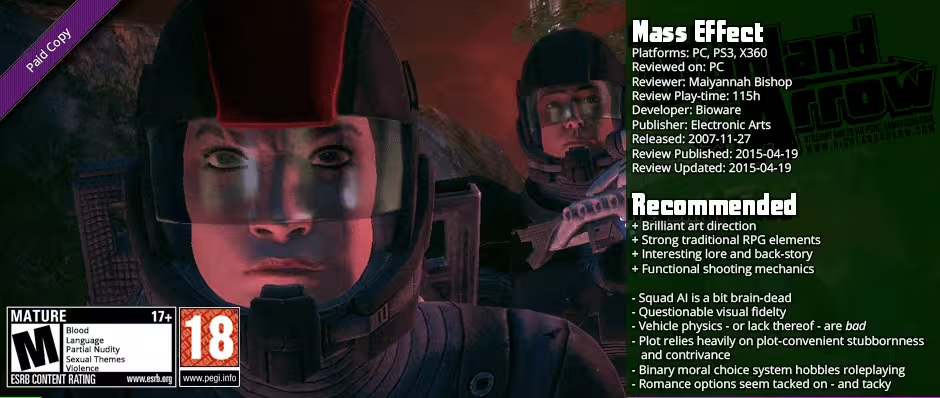

Mass Effect is a science-fiction RPG with a focus on cover shooting developed by Bioware and published originally by Microsoft Games and now by Electronic Arts following their acquisition of the studio. Well, here's a hard one to look back on, because I wager there are precisely zero things that I can say about this game that won't make someone somewhere unhappy, so strap in dear readers, here we go regardless.
Standout in Mass Effect has to be the world-building

While the plot itself owes a lot to some very generic flourishes, which I'll touch on later, the one thing Bioware did well in Mass Effect, arguably better than any other original-IP science-fiction RPG of late, is world-building. It presents a beautifully-realised world full of all sorts of interesting lore and species to interact with, and there is some obvious thought put into the construction of that world, especially in the central transport technology that is the titular draw. Just about everything you can poke with an interaction prompt will have a related codex entry, and the world(s) presented feel coherent, consistent, and interesting.
The voice acting is quite strong too, which certainly helps in a game that is half dialogue. This is probably the role that Jennifer Hale will be remembered for (as the female protagonist), but good performances are delivered by Keith David (Cpt. Anderson), Brandon Keener (Garrus), and Lance Henriksen (Admiral Steve Hackett). (Aside: I was a little surprised, given his pedigree, why Lance Henriksen didn't figure more into the press stuff more, back in the day.) There's a few awkward lines, but those come more from stilted dialogue scripts than the delivery, as that delivery is usually pretty decent when it's not more solid and on point. There isn't really any voice actor that I'd point to as bad, just some that are better than others.
That's not to say that the art direction proper doesn't help here, with some pretty amazing visual design to the various ships, races, and technology you encounter throughout the game. The spacecraft, from the Citadel space station to the Normandy you command and more, the ships evoke a very cool rehash of old 80s science fiction art and I rather enjoy the designs, a little something new and a little something old, and this carries over to the body armour suits and the weaponry as well. That's not to say it is diminished somewhat by the graphical fidelity, with a weird combination of decent texture quality and 90s-blocky, and this weird film grain effect that no doubt is trying to hide how washed-out the game looks.
Arguably the one thing that holds the game together in that regard however is the sandboxy, exploration feel it has, for there are a variety of worlds you can go to and explore, many of them entirely optional and secondary to the plot. You can find resources, special collectibles, and some secret side-quest locations of various flavours by doing so, all of which do in their own way help you progress and feel stronger. The debris locations are usually gear of some sort to pick up, the ore deposits count towards a surveying quest you get paid out for, and the various anomalous readings are special points of interest, usually fairly unique as well.
The exploration, however, is marred by the means by which you do so
As nice as the worlds are, the means of getting around them is anything but. That MAKO vehicle you might cast your eyes up towards the boxout above to see, doesn't so handle poorly as it doesn't handle at all. It's primary method of locomotion is bouncing.
And bouncing.
Bounce bounce bounce.
And bouncing some more.
While some of you might find that ridiculous physics that has the MAKO bouncing around like that and yet miraculously gluing itself to the ground at the end of it hilarious, it's a humour that wears threadbare after the first few worlds, descending from there into a rapidly-annoying point of frustration, as you constantly have to fight with the vehicle to get anywhere on those planets. It would be a great deal more frustrating, perhaps, if it was not a mandatory mechanic, but it is also used in one of the story missions, and under pressure too, as if to rub some salt into the no-doubt-open-wound that the mechanic is. I don't think I've found an UE3 engine game whose vehicle physics I particularly enjoy, and that certainly isn't in danger of changing with Mass Effect, that is for sure.
Shephard has a fairly generic story arc, but not a bad one either
The game begins with you customising your variation of "Shephard", last name always the same so as Bioware can use it's old voice acting trick of referring to a title rather than a name, albeit this time with a last name. You choose some basic background elements, fiddle with the appearance sliders as takes your fancy, and then get dropped into the shakedown cruise of the Normandy, which quickly becomes much more as the colony you were sent to is attacked, and it is revealed that you are being vetted for the Jedi - I mean Spectres.
Yeah, it feels a little bit like the typical good guy hunts elusive bad guy thing that isn't so much ground well-trodden for Bioware as ground passed over so often they've paved it and there's now a bus route, but to Mass Effect's credit, the stops along the way in this typical arc (which I'm not going to spoil, just in case you're one of the three people on Earth who has yet to play Mass Effect) are fairly interesting, and the gameplay is kept relatively varied between them, with some that are exploratory and shooty, others that are much more hinged on the gift of gab.
One thing that Mass Effect does do fairly well in that regard is pacing, as things ramp up relatively well and at a decent pace, although the urge to go exploring the pseudo-sandbox can dampen that a bit in spots. It all works with rising action towards the central conflict however, and that central conflict is certainly quite exciting and noteworthy, and moreover on the game design side does a good job of being a "final exam" as it were of the game's gameplay mechanics, which is the mark of some thoughtful end boss design.
If there's any problem I have with Mass Effect and its overall narrative, it's how the sandbox undermines it in places. As I mentioned, the exploration often pulls the player away from the action, and I know many players who, due to the optional nature of it, will avoid it for that reason, though you lose out on a fair bit of an advantage by doing so since there's a lot to find on those worlds and many side missions. That's just one of the things it does to dull the game story though. The arguably strongest element of that exploration - finding those side missions, the various outposts, secret research facilities, and the like, presents the game with a myriad of loose ends which the game never really pays off for the most part, save by the debrief at the end. What happened to the many people that you came across before? Well, one of the big over-arching themes does get paid off in the sequel (which I'll get to in a later review no doubt), but a lot of others simply remain largely unresolved. That's the problem with Bioware in general: they're good at world-building, not so great at the pay-out.
Mechanically, the game is sound for the most part, other than those vehicle physics
Though I wouldn't say there's much to talk about here either: there's basically three key mechanics - player skill advancement which is the standard "level up, spend points, get advantages" gambit and while it's fairly well-balanced I found it wholly unremarkable, there's no bright new ideas here - then there's the inventory management with the continual upgrading of weapons like a gun-loving germaphobe, which I found to be more busy-work than anything else - and finally, the meat of the game, the conversation system.
The conversations have branching paths, with the side discussion for lore type stuff, and you will be fairly familiar with it if you played Knights of the Old Republic, and includes the binary moral choice system. While I know many people will likely enjoy the moral choices here, I found it personally rather restrictive, as I was constantly curtailed from being able to play the character I wanted because I didn't have enough saint or wanker points, or hadn't gotten the appropriate skill points level (depriving important combat skills of points). It's not enough to be a significant impairment to the story since it only changes a few key points and there's workarounds, but frustrating nonetheless.
Character writing in the game is strong enough, but the AI is lacking, as is romance
The big mechanical problem that Mass Effect has in the more RPG/cover-shooter bit is the fact that it tries to be a more tactical variation of such, but the party AI is dumb as a sack of bricks, constantly standing out in the open and just eating devastating hits, under-using their abilities and weapons, and often getting directly in the way of yourself and the target (doubly frustrating if you're playing a sniper). You can give them direct orders in the pause mode, but it becomes an onerous exercise in hand-holding, and usually for little tangiable benefit since it doesn't really effect the fact that the AI is still pretty brain-dead when you release control.
This undermined the otherwise-decent characterisation of the various party members you can take with you. Their writing is a bit stilted in places, with the artificial seams of the "video game dialogue" showing through in not coming off as natural sometimes, but the characters themselves are believable and likable for the better part, excepting of course the characters the game is making you want to hate. There are some odd, plot-convenient moments of stubbornness on the protagonist's part to push forward the plot that come across as contrived, but the various secondary characters for their part react believably, which is the important thing.
Less believable are the sex scenes in the game, and the romances in general, which to speak frankly come off as put in the game as an after-thought and often left quite under-developed, which makes the case some made for them being objectifying somewhat reasonable. I don't find them offensive, really, but that doesn't mean I think they're particularly tasteful either. It's the same kind of bodice-ripper nonsense you get in harem games, just in a smaller scale, with certain characters practically jumping Shephard if you go through their story progression to its natural conclusion. It has the same problem as Dragon Age - it doesn't feel like a natural and emotional relationship, but rather like the reward at the end of a quest-line. I didn't mind it, nor was I put off by it, but I also wanted to give it a complete pass too. It's fanservice and little more.


